Margaret Thatcher: How the economy changed
- Published
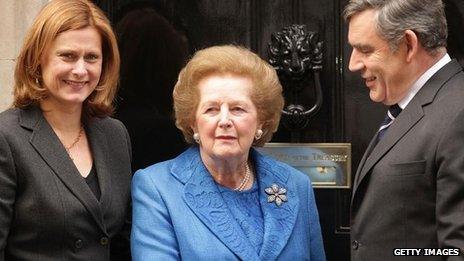
Whether it was the invitations to tea from Labour prime ministers Blair and Brown, or the fact that large swathes of Conservative reforms survived through the New Labour years, Baroness Thatcher's impact on her opposition is amongst her lasting economic legacies.
The trademark privatisations, the embedding of market economics and much of the labour market reform agenda were left untouched after Labour's victory in 1997.
Few commentators or economists would disagree that Margaret Thatcher's premiership had a profound impact on the British economy.
The old line about Britain being the "sick man of Europe" in the late 1970s still rings true. Double-digit inflation and what was perceived as excessive union power were part of national life. The winter of discontent and a minority Labour Government, seemingly unable to get a grip, cemented the sense of national decay.
Professor Patrick Minford of Cardiff University was an economic adviser to Mrs Thatcher in opposition and remained a close confidant during her early years in office. He likens the power of vested interests and the refusal to countenance reform in the Britain of the late 1970s to the more recent economy history of Italy.
"The establishment didn't want change, there was so much opposition but she transformed the economy - without her it wouldn't have happened," he said.
Soaraway prices
Taming inflation was Mrs Thatcher's first priority. Tough budgetary policies, aimed at controlling public spending combined with a tight monetary stance, were designed to reduce inflation expectations. Getting people to believe inflation would fall, and so reduce their wage demands, was the aim.
For a while it worked. Cost of living increases fell rapidly in the early 1980s. An acceptance that monetary discipline should be central to policymaking shaped the inflation targeting of subsequent decades.
Cutting back the power of a dominant state sector was a mantra of Thatcherism. The public sector was to retreat from large areas of the industrial landscape. Privatisations, including Rolls-Royce, BT, British Airways and British Gas, would have seemed unthinkable a few years before, but were pushed through with zeal. Renationalisation never found its way back onto New Labour's agenda.
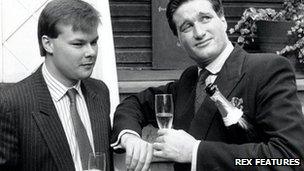
Wealth creation and unregulated markets were key
So-called supply side reform, covering the labour market and tax cuts to boost enterprise was another key feature of Thatcherite economic policy. Reducing the influence of trade unions may have been unpopular with members and the Labour left but the tide has not been reversed by subsequent governments.
A belief in wealth creation and the freedom of entrepreneurs to grow their companies and create jobs were central to Mrs Thatcher's economic policy. They have not been rejected by her successors.
The critics will point to the destruction of manufacturing capacity in the early years of Mrs Thatcher. Tight monetary policy, which fuelled a strong pound , acted like a dose of salts on a swathe of industrial Britain. Jobs and skills lost in some communities have never been fully replaced. For those who believe in the importance of manufacturing in a 21st century economy, the Thatcher years hastened the decline of a key exporting sector.
The "Big Bang" reforms in the City of London have been seen by some as an early contributory factor in the unsustainable expansion of the banking industry. In some senses the dominance of the belief in minimal regulation and market forces which prevailed in the years before 2008 was another legacy of Margaret Thatcher.
Agree with her or not, Lady Thatcher's influence on economic philosophy is demonstrated by the fact that so many of her ideas, which seemed radical at the time, are now part of mainstream thinking. In destroying an old consensus, she created a new one.
How the economy changed under Margaret Thatcher:
Overall government spending did actually go up in the Thatcher period. It rose by almost 13% between 1979 and 1990 in real terms (stripping out the effect of inflation).
Nonetheless as a percentage of GDP, thanks to some economic growth and the money saved through privatisations, government spending decreased.
Government spending as a percentage of GDP 1976-2010
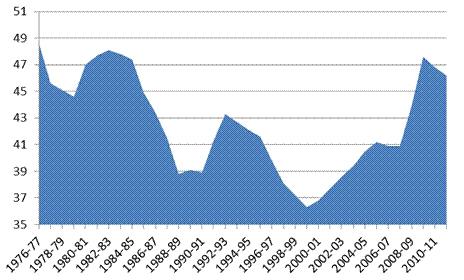
Source: ONS
Inflation peaked at 18% in 1980. After that, rate decreased markedly, although started to sharply rise again shortly before and after she left office.
Inflation rate (%) 1976-1992
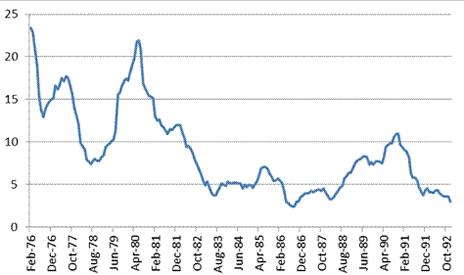
Unemployment was never lower in the Thatcher period than it was in 1979 when she was elected prime minister.
It did not return to that level until the mid 2000s and has not returned to the heights it reached in the mid 1980s since.
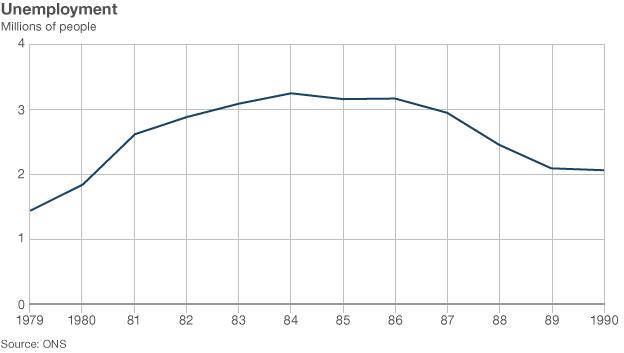
Economics research by Lewis Goodall, BBC Analysis and Research.